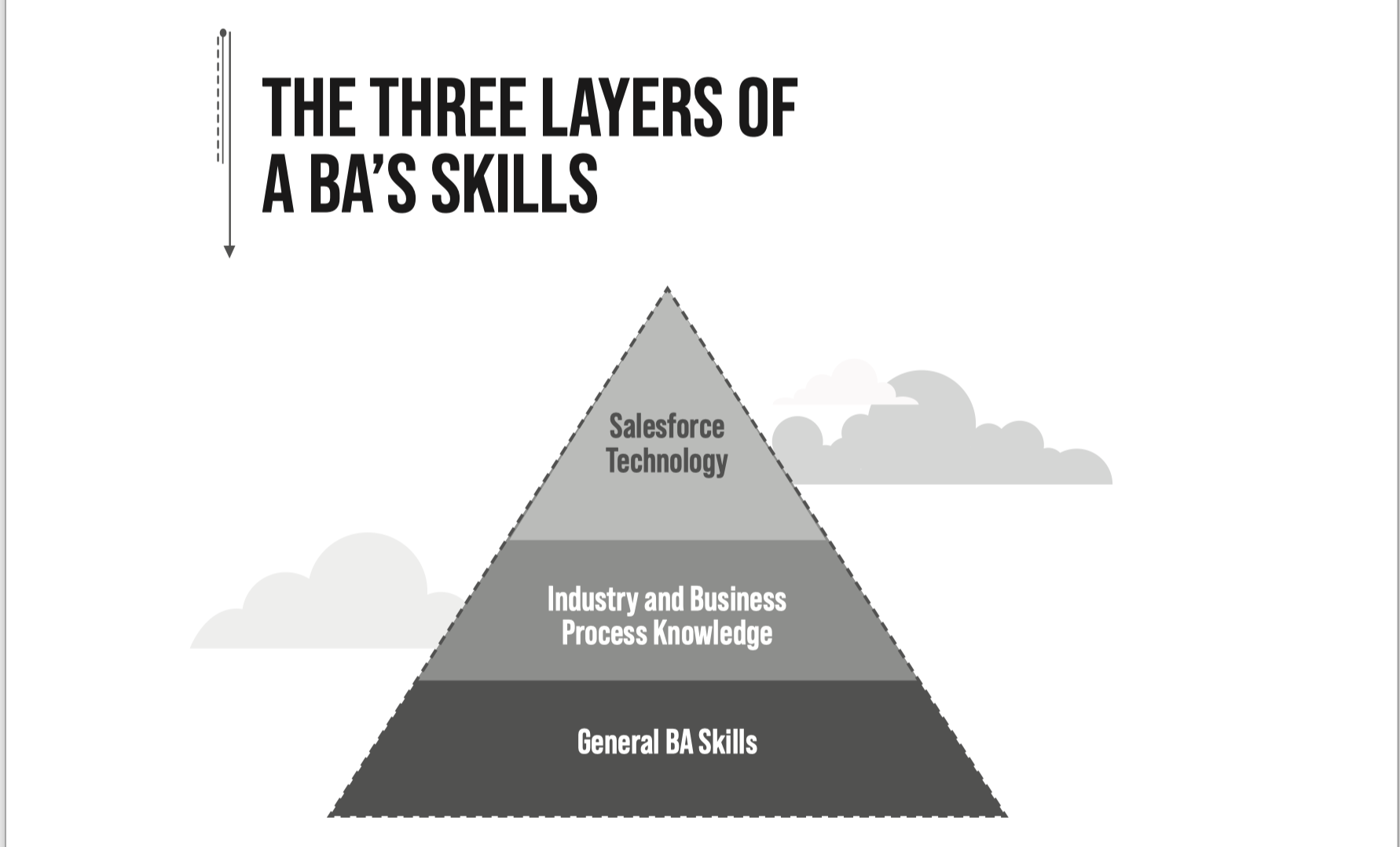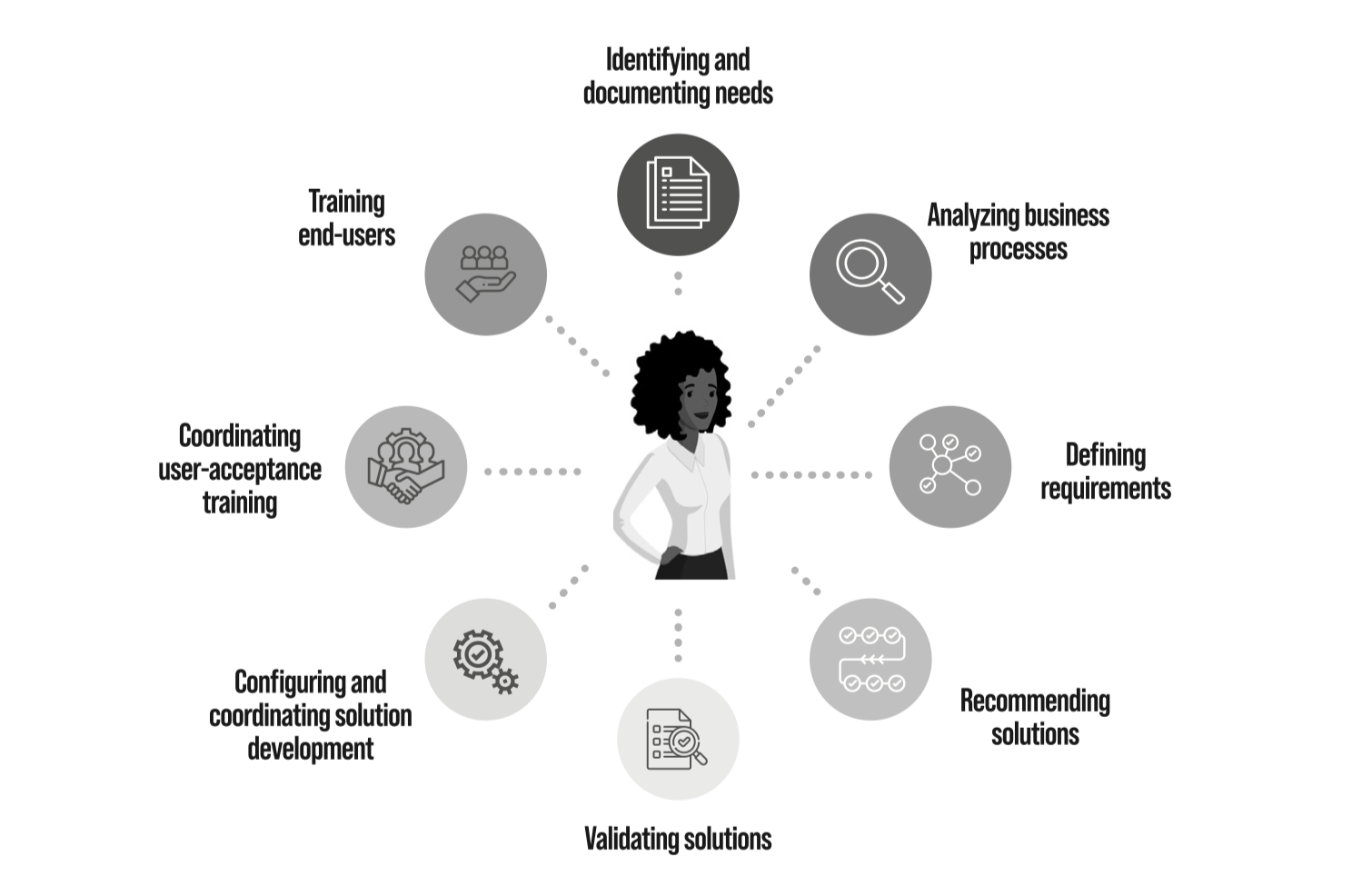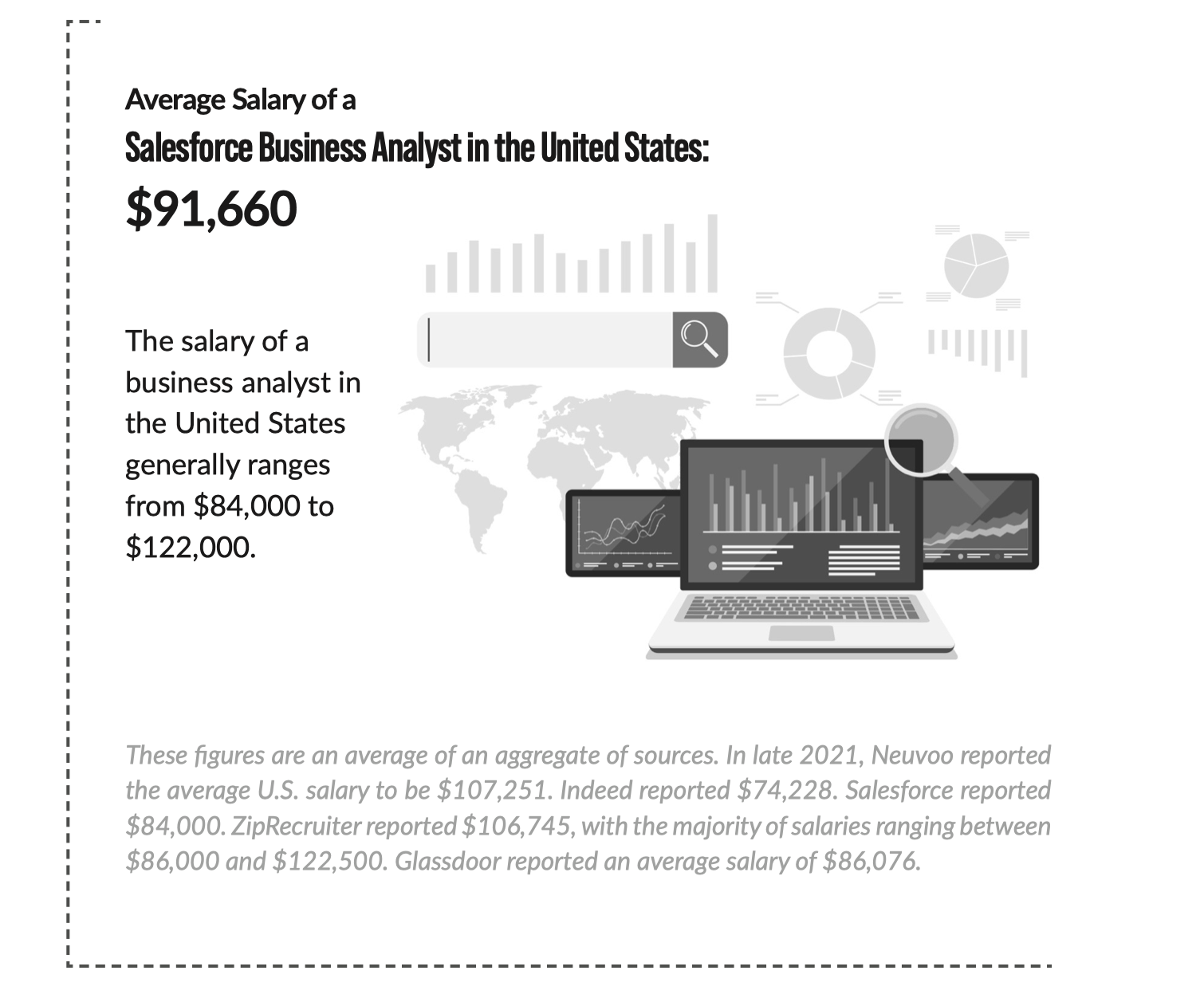What is a Salesforce Business Analyst?
A Salesforce business analyst is involved in every step of a Salesforce project or functional enhancement, from identifying requirements, solution design, coordinating with developers, implementing, testing, and training users.
In addition to general IT business analyst skills, a Salesforce “BA” is a specialist who understands the capabilities of the Salesforce platform and the business processes that it supports.

Three layers exist to a Salesforce business analyst’s skills. The fundamental layer is general BA skills, which is a requirement for any job as a business analyst. Next, a Salesforce business analyst will have an easier time securing a job if the analyst has domain knowledge in the industry—for instance, financial services, insurance, or manufacturing—and understands the business processes of a particular organization. Though industry knowledge is helpful, it is not necessarily required. The top layer, though, is knowledge of the Salesforce platform, and this layer is a necessity for anyone pursuing a role as a Salesforce business analyst. This layer allows the analyst to effectively recommend solutions that can be enabled by the platform.
The role of a Salesforce-specific business analyst is the same as it would be for any other IT business analyst: Identify needs and recommend solutions to bridge the gap between current business processes and the desired state that will improve outcomes and help meet objectives.
The analyst is responsible for understanding not only the capabilities of Salesforce, but also the various business processes at play within an organization. Although Salesforce can be used to enable a wide variety of business processes, it is typically used in marketing, sales, and service processes. As such, a Salesforce business analyst is expected to have a working knowledge in one or more of these areas in terms of understanding both business process as well as the features that Salesforce offers that can enable them.
A dedicated Salesforce business analyst role is typically reserved for large end-user firms. At a smaller to mid-size firm, an administrator or project manager may wear multiple hats and also act as a business analyst.
The business analyst is one of multiple Salesforce resources working on a project team. Whereas the administrator on the team manages the day-to-day use of Salesforce, the business analyst is tasked with understanding the business, documenting needs, overhauling processes, and ensuring solutions are delivered to meet stakeholder needs.
Importantly, the analyst needs to know that the solutions being asked for by the end-users are not always the best or most efficient solutions for addressing that need. Because the end-users are not the Salesforce experts, they will not know if a better solution exists.
What does a Salesforce Business Analyst do?
The role of a Salesforce business analyst will differ from company to company, but will typically involve some or all of the following:
• Identifying and documenting needs
• Analyzing business processes
• Defining requirements
• Recommending solutions
• Validating solutions
• Configuring and coordinating solution development
• Coordinating user-acceptance training
• Training end-users

Identifying and Documenting Needs
A business analyst is responsible for collecting and organizing needs, issues, and requests via interviews with users, questionnaires, meetings, observations, workshops, brainstorming sessions, and use cases. Requirements-gathering is one of the most important things—if not the most important thing—that a business analyst does.
Analyzing Business Processes
A business analyst will understand current-state business processes and analyze how they can be improved to meet business needs and objectives.
Defining Requirements
An analyst generates a list of requirements from users and stakeholders. A good business analyst is also skilled at documenting and keeping information organized. Requirements are then turned into a document or user story that describes business and functional requirements. In addition, the business analyst needs to consider other aspects of a solution, including data migration and integration requirements.
Recommending Solutions
The analyst is responsible for knowing how the capabilities of the Salesforce platform can be used to enable the future-state business processes and recommend appropriate high-level solutions. The solution the customer is asking for is not always the best or most efficient way to solve the problem, but the customer will not know if there is an easier way to address their need. The business analyst works with a solution architect (if the role exists at the organization) to translate functional requirements into the most appropriate technical solutions.
Validating Solutions
The analyst reviews and validates the potential solution with the stakeholders, often using tools such as user stories and wireframes. User stories are used in the Agile methodology to document use cases that describe, in story version, requirements and how a process will be used. Wireframes are sketches or mockups of the screen layout and are used to visually communicate and validate how the Salesforce user interface will be used in the solution.
Configuring and Coordinating Solution Development
When a business analyst fills multiple roles, the business analyst may also be responsible for configuring part or all of a solution in Salesforce, particularly when the solution can be achieved using declarative capabilities of the platform. When a solution requires a developer or involves an outside vendor, the business analyst will communicate requirements and validate solutions before they are shown to end-users, acting as a representative for the business requirements. When solutions are ready, the business analyst may participate or run system demonstrations to end-users.
Coordinating User-Acceptance Testing
When a solution is ready to be tested by end-users, the business analyst often ensures the solution is ready to be tested, facilitates testing sessions, answers questions, documents issues, and communicates with the technical team to get the issues resolved and retested.
Training End-Users
With the knowledge of the business requirements, business process, and system solution, a business analyst often trains end-users when a solution is implemented.
How much does a Salesforce Business Analyst earn?
The role of a Salesforce business analyst will differ from company to company, but will typically involve some or all of the following:

How to get a job as a Salesforce Business Analyst?
As a business analyst bridges the gap between IT and non-technical end-users, the analyst must be capable of communicating in two languages: first, in technical terms with the IT department, and, second, in layman’s terms for end-users. Because an analyst is the bridge between the business and IT side, business analysts need a combination of business skills and IT skills.
These skills will vary from job-to-job, but technology-related skill requirements often include:
• Demonstrated knowledge and experience of the Salesforce platform capabilities, in particular Sales, Service, Experience, and Marketing Cloud.
• Demonstrated knowledge of the Salesforce declarative platform capabilities, including process automation tools, and the appropriate use of programmatic customization.
• Working knowledge of Agile delivery and scrum framework
• Salesforce certifications, specifically Business Analyst, Administrator, Sales Cloud Consultant, Service Cloud Consultant, Experience Cloud, and Marketing Cloud Consultant.

I have always found that I span the bridge between technical and non-technical really well. I can understand the developer’s requirements, elicit the businessperson’s requirements, and explain to each person how these components mesh together.
Yelena Slobard
Business analyst for a medium-sized consulting company
Salesforce Business Analyst Business and Soft Skills
Along with technology-related skills, employers also look for business analysts with related general business and soft skills, which could include:
Confidence
Business analysts must be able to defend best practices for meeting goals and remain steadfast in making sure that a system configuration is justified by a business need.
Communication
Business analysts must be able to tailor their vocabulary when speaking to different stakeholders, including end-users, IT, and executives. Business analysts often meet with end-users who do not know what they want, or who are unable to articulate what they want. This requires excellent communication skills on behalf of the business analysts, who might need to ask probing questions or change the communication style.
Facilitation
In the words of Donna Hudson, a business analyst at a consulting company, “Business analysts are trying to get a group from one place to another place, so when conversations start to veer off track, you have to gently nudge people back into focus and back on that path.”
Elicitation
Business analysts are charged with listening and extracting small bits of information that might be key to a business solution.
Problem-solving
Inevitably, a new process will present challenges or create problems that need to be addressed. The analyst is responsible for revising solutions as issues unfold.
Patience
Remember that business analysts work with non-technical end-users, some of whom require multiple sessions before the technology “clicks.” The best business analysts can keep frustration at bay and remain calm and composed while training end-users.
Tips to get a job as a Salesforce Business Analyst
To present as a strong Salesforce business analyst candidate, consider the following tips.
First, be honest with yourself about your strengths and interests.
Consider whether you prefer understanding how a business process works and whether you enjoy dealing with people. Can you effectively run meetings and workshops with conflicting priorities and various stakeholders? Or, would you rather be developing solutions? If you would rather spend your time on the technical side, a different role may be more suitable for you.
Remember that there is no one-path-fits-all.
Some analysts have a business or IT background. You could also navigate your way into a business analyst role after being a Salesforce administrator or a general IT business analyst, or after having a customer-facing sales or service business role.
Demonstrate your competence in the three layers.
These three layers are: 1) general business analyst skills, 2) industry or business process knowledge, particularly in sales and marketing processes; and 3) knowledge of the capabilities of the Salesforce platform.
Relate your understanding of functional capabilities to marketing, sales, and service processes.
For example, be ready to talk through how the sales stages of an opportunity can be configured to support customized sales processes. On the service side, know how support processes can be configured to support the lifecycle of cases and how case-automation features can fulfill requirements.
Be prepared to explain transferrable skills.
You may have not had the title of a business analyst, but perhaps you did fulfill a number of the responsibilities, such as managing stakeholders, gathering requirements, facilitating workshops, improving processes, documenting, designing solutions, implementing CRM, or training users.
If you have previous experience and want to become a Salesforce specialist, consider obtaining the Admin certification.
This will demonstrate that you have knowledge of the fundamentals of the platform. A further certification, such as Sales Cloud Consultant, Service Cloud Consultant, or Marketing Cloud Consultant will be helpful to further demonstrate expertise.
Be ready to discuss examples of identifying opportunities and implementing process improvements.
This is particularly relevant if you have worked in a customer-facing role in sales or service. Also be ready with examples of your communication, facilitation, and negotiation skills that you have developed in your previous roles.
Think in terms of processes first and solutions second.
If you have a technical IT background, resist the temptation to jump to solution mode and discuss Salesforce functionality before understanding business needs.
Be prepared to answer the basic questions about how you would perform as a business analyst.
Think about the answers to these questions: How would you go about meeting with stakeholders? How would you ask questions to understand needs and elicit requirements? How would you run workshops to understand business processes and challenges?
Gain experience at your current job, if possible.
If you work for a large company that already uses Salesforce, build up your experience and portfolio by looking for ways to get involved in Salesforce-related projects even if this means volunteering your time beyond your current role.
Get involved.
Attend Salesforce events, like World Tour and Dreamin. Get involved in the online Trailblazer community and join online collaboration groups. Complete superbadges. Go to user group meetings. You could meet someone who knows of an opportunity, paid or unpaid, that could help you.
Brainstorm ideas on how you could promote yourself even before an interview by providing an example of your skills.
For example, you could record a video that showcases your ability to understand a list of mock requirements and how you would recommend meeting the requirements in Salesforce, even going so far as to show a configured Salesforce feature.